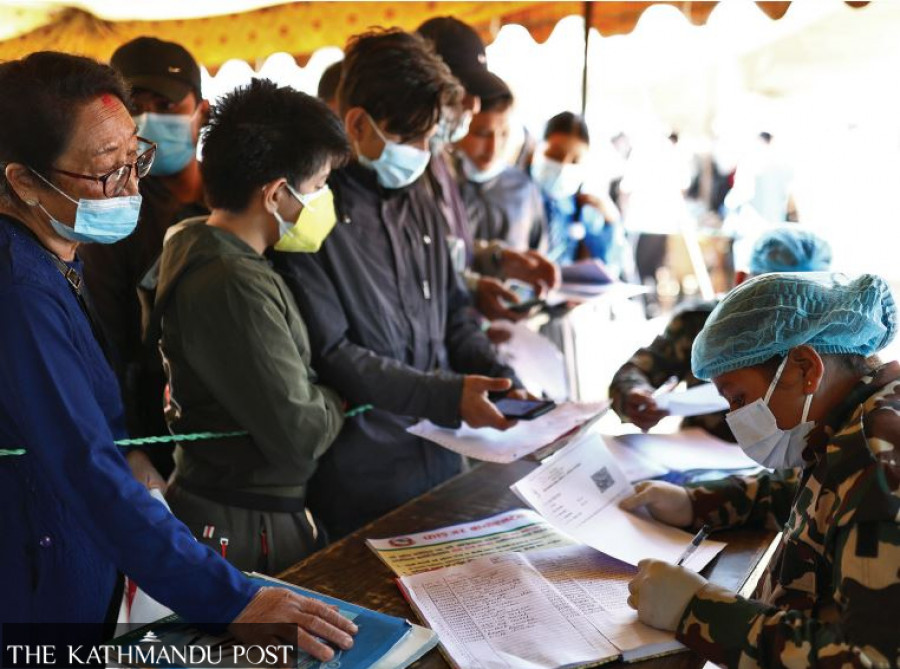
In this shot taken last week, Nepal Army Hospital at Chhauni in Kathmandu administers the Pfizer-BioNTech Covid-19 vaccine. Sanjog Manandhar/TKP
Health authorities on Sunday opened the Pfizer-BioNTech Covid-19 vaccine for all the children above 12 years old, but without any prior announcement.
Hundreds of children were immunised with the vaccine on Sunday itself, according to officials. Earlier the government had decided to provide it to people with compromised immunity.
“As very few people with comorbidities came for the Pfizer-BioNTech Covid-19 vaccine, we have decided to administer the jab to children above 12 years old,” Dr Samir Kumar Adhikari, joint spokesperson for the Ministry of Health and Population, told the Post.
After health authorities decided to open the jabs for all, health workers including doctors informed their relatives and acquaintances to bring the children to hospitals for the vaccine, a staffer at Civil hospital, informed.
“Around 1,500 children, who do not have any comorbidities received vaccine from various hospitals of the district,” Sambhu Kafle, chief of the Health Office, Kathmandu, told the Post. “We will administer the jabs to the children above 12 on Monday and Tuesday also.”
The Health Ministry had earlier decided that all immunocompromised people including children above 12 years old would be administered the Pfizer-BioNTech vaccine from 24 hospitals throughout the country. And vaccination started from November 14.
The ministry said that only around 7,000 people have taken the Pfizer-BioNTech vaccine in the last seven days. Officials said the number of vaccinated people will go up, after all hospitals send the final vaccination data.
Officials at the Health Ministry estimated that the actual number of people with comorbidities receiving Pfizer-BioNTech Covid-19 vaccine could be even fewer, as hundreds of people might have taken the jab as booster shots.
“Several doctors told me that they have provided the jab as booster shots to the people, who have already taken other vaccines,” an official at the Department of Health Services said, asking not to be named. “A lot of people have comorbidities— blood pressure and diabetes. So, many clever people took the booster shots by showing doctor’s prescriptions that they have been taking medicines for blood pressure and diabetes.”
Public health experts said that such an ad-hoc decision is not new and it seems that government officials are not learning anything from past mistakes.
“Can’t we halt vaccination for two days and search for people with comorbidities?” Dr Shyam Raj Upreti, coordinator of the Covid-19 Vaccine Advisory Committee, told the Post. “Due to such adhocism, the unvaccinated people will be deprived of vaccines for an indefinite period.”
Earlier, the Health Ministry had provided Covid-19 vaccines to journalists, bureaucrats, people serving in diplomatic missions, lawmakers and ministers breaching the priority rules.
“Authorities should spend time to find those who are not aware of the vaccination drive and vaccinate them,” said Upreti. “As the vaccines are being administered from 24 hospitals only, the majority of children who do not have immediate access to the hospitals will not get the jabs.”
Nepal received 100,620 doses of Pfizer-BioNtech Covid-19 vaccine provided by the United States through COVAX, the international vaccine-sharing scheme backed by the United Nations, on October 25.
As the doses were insufficient for the general population, the Health Ministry had decided to administer the jabs to those with comorbidities—renal failure, those taking dialysis treatments, people taking medicines after organ transplantation, cancer patients and those suffering from lung diseases.
Likewise, those who have been taking medicines for high blood pressure, people suffering from diabetes, heart ailments and those with compromised immunity due to various reasons including HIV/AIDS will also get the Pfizer shots.
The vaccine is being administered from Bir Hospital, Army hospital, Civil Hospital, Patan Hospital, Bhaktapur Cancer Hospital, Tribhuvan University Teaching Hospital, Shahid Gangalal National Heart Centre and Shahid Dharmabhakta National Transplant Centre Bhaktapur in Kathmandu Valley.
Likewise BP Koirala Memorial Cancer Hospital in Bharatpur and Dhulikhel Hospital in Kavre are also providing the vaccine targeting the people of Bagmati Province.
In Province 1, the vaccine is being administered at BP Koirala Institute of Health Sciences, Dharan; Mechi Zonal Hospital, Jhapa; and Koshi Hospital. In Province 2, Gajendra Narayan Singh Hospital, Janakpur Hospital, and Narayani Hospital are administering the vaccine.
In Gandaki Province, the vaccine is being administered at Gandaki Academy of Health Sciences, and Dhaulagiri Hospital in Baglung, and in Province 5 at Lumbini Provincial Hospital, Butwal, Rapti Academy of Health Sciences, Dang, and Bheri Hospital, Banke.
Similarly, In Karnali Province, the vaccine is being administered at Province Hospital, Surkhet, and in Sudurpaschim Province, from Seti Provincial Hospital, Dhangadhi, and Dadeldhura Hospital.
Nepal needs to vaccinate around 78 percent of its 30 million population—or around 25 million people, as per the government’s new plan that includes those aged between 12 and 18 years. The government earlier had planned to vaccinate only those aged 15 years and above.
Since around 4-5 million people are said to be living abroad, the government needs to vaccinate around 19-20 million people. For this, the country needs a little over 40 million doses of double-shot vaccines.
Nepal so far has received 23,163,930 doses of Covid-19 vaccines–Vero Cell, AstraZeneca, Janssen and Pfizer-BioNTech.
Of them, the COVAX facility has supplied 4,806,210 doses.
As of Sunday, 7,713,409 (25.4 percent of the total population) have been fully vaccinated, according to the Health Ministry.













